The 20 questions that will save your relationship
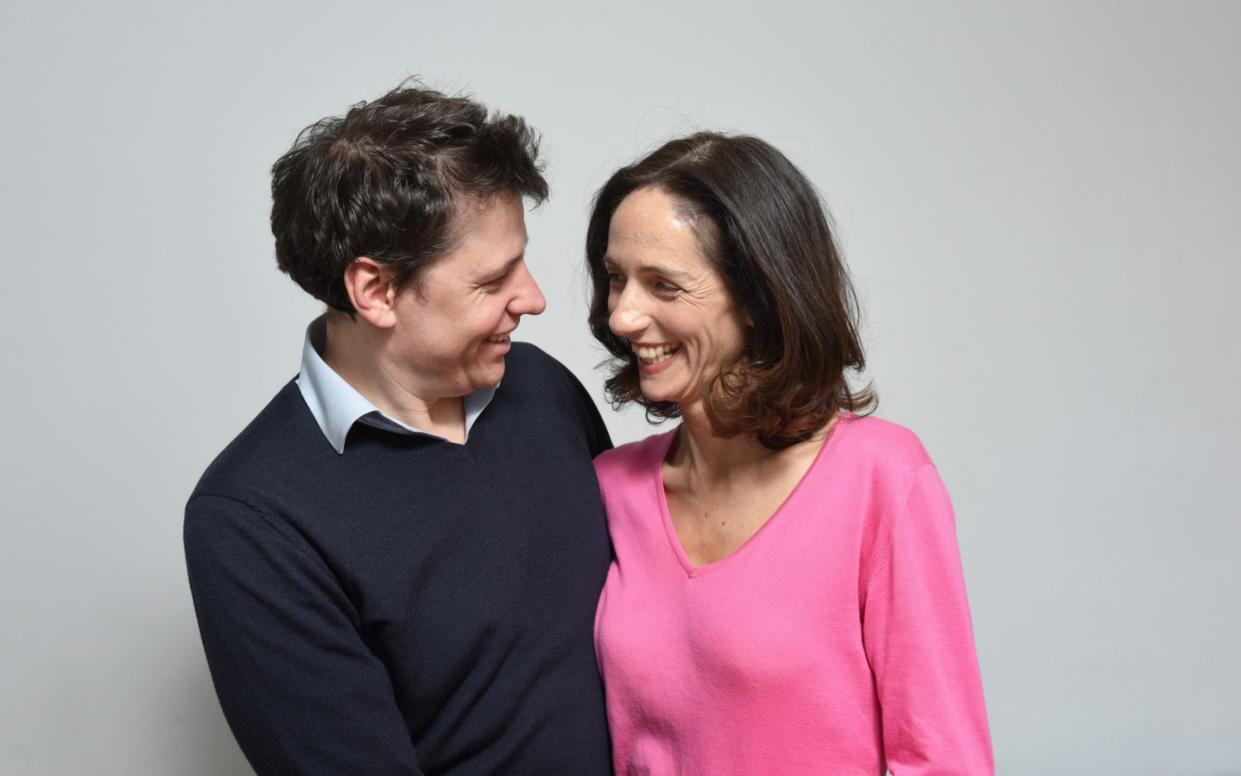
Everyone in a long-term relationship knows there’s a price to be paid for security. All-night sex sessions are traded for a good night’s sleep, and “lovey-dovey” chats cede to logistical briefings. (When did you last have a conversation that didn’t end with: “You forgot to buy BIN BAGS?!”) As the years pass, it’s too easy for partners to take each other for granted – and then a matter of time before one takes themselves off altogether. Fail to connect, and it could be you begging: “Can We Start Again Please?”
A married mother of three, I mostly get my “buzz” from sticking a knife in the toaster
This is the name of the new book by Andrew G Marshall, a marital therapist with 30 years’ experience. Packed with tools for communication, and tips for re-kindling the spark, Can We Start Again Please? claims to help couples keen to improve a good relationship – but also promises aid to unluckier lovers fighting a more rearguard action: how do you battle for your marriage when your spouse is in full retreat?
“This book has been created to help you recruit him or her to try again,” claims Andrew. And if you think recruitment doesn’t sound romantic, relax: he’s devised “20 questions to fall back in love.” Yes, it’s that simple.
And it’s based on science: 20 years ago, Dr Arthur Aron, a US psychologist, tried an experiment to make two strangers fall in love by answering a series of questions together. Result: six months later, Dr Aron’s research team got invited to their wedding! The conclusion seemed clear: intimacy can be accelerated if we cut to the (conversational) chase. But can it be thus re-captured? Andrew believes so. He’s adapted Dr Aron’s questions – and added many of his own. So could it work for me? A married mother of three, I mostly get my “buzz” from sticking a knife in the toaster. If Andrew can electrify my marriage, I’m in!
First, I have to steer my husband, Mat, off the sofa: “Come on, dear. We are going to fall in love again.” “Do we have to?” he groans, but rallies when I promise it’ll only take an hour, and we can drink throughout. (Andrew urges those attempting his questions to dress up and make for a wine bar, as if enjoying a first date). Mat and I trundle to a suitably dismal venue, where we attempt to look into each other’s eyes and properly talk rather than play with our phones.
The 20 questions
Andrew explains: “Each comes with an explanation of what I’m trying to achieve and how to explore the topic further. I have divided them up into three sections so they get progressively more intimate. Once you’ve read this section, discuss the idea of doing them with your partner, but try not to think about your answers until you get together as I’d like you to be spontaneous and say what feels right in the moment – looking into your partner’s eyes.”
Section one: General
1. If you were stranded with someone in the jungle who, beyond me, would you like it to be?
Why?
A simple warm-up question.
Take it further
How do you think each other would cope in the jungle? How well would your two choices of companion get on together?
2. In what period in history would you like to have lived and why?
Why?
Shines a light into your interests and dreams.
Take it further
What do your choices reveal about each other?
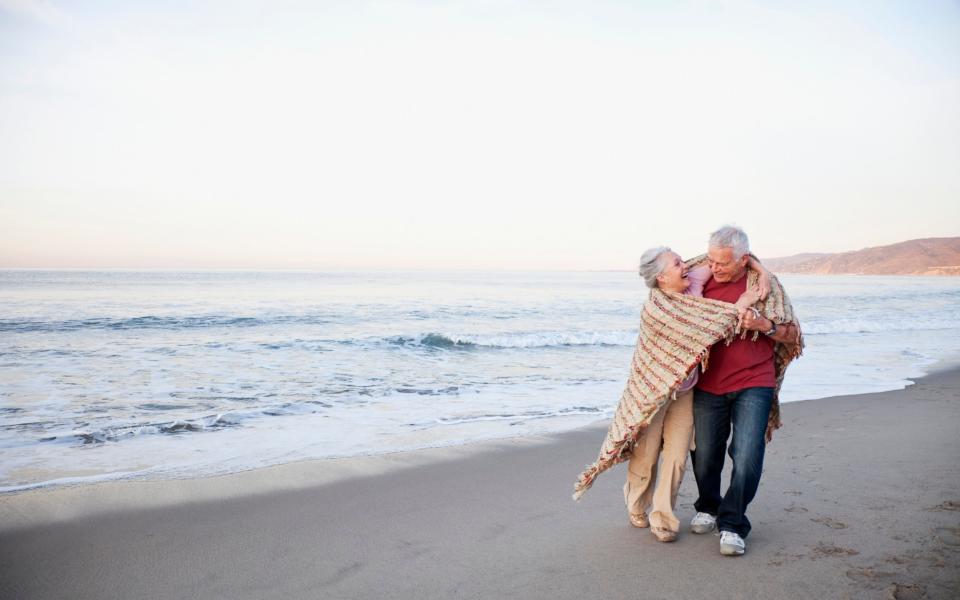
3. If you could have a superpower, what would it be?
Why?
It’s a graphic way of revealing what we find hard.
Take it further
I’ve had clients who wanted to be invisible because they always felt in the wrong as a child, or who wanted to be made of rubber so they could bend in the ways people expected. So why is your – and your partner’s – chosen superpower so appealing?
4. What would be your perfect day, from waking up in the morning to falling asleep at night?
Why?
We think we know what our partner likes, but do we really?
Take it further
At this point, I’d like you to simply imagine the day – but you could actually do it later.
5. If you could ask one of your grandparents or your parents one thing, who would you choose and what would it be?
Why?
To examine your relationship with key people in your life through fresh eyes.
Take it further
What families don’t talk about is always interesting, and shines a light into ways you were made to conform as children to rules of which you were only half aware.
6. For what in your life – beyond marriage and children – do you feel most grateful?
Why?
We seldom stop and count our blessings; this is a good opportunity.
Take it further
People are often more focused on what they don’t have than what they do. Consider if you fall into this trap and, if so, what the impact is on those around you.
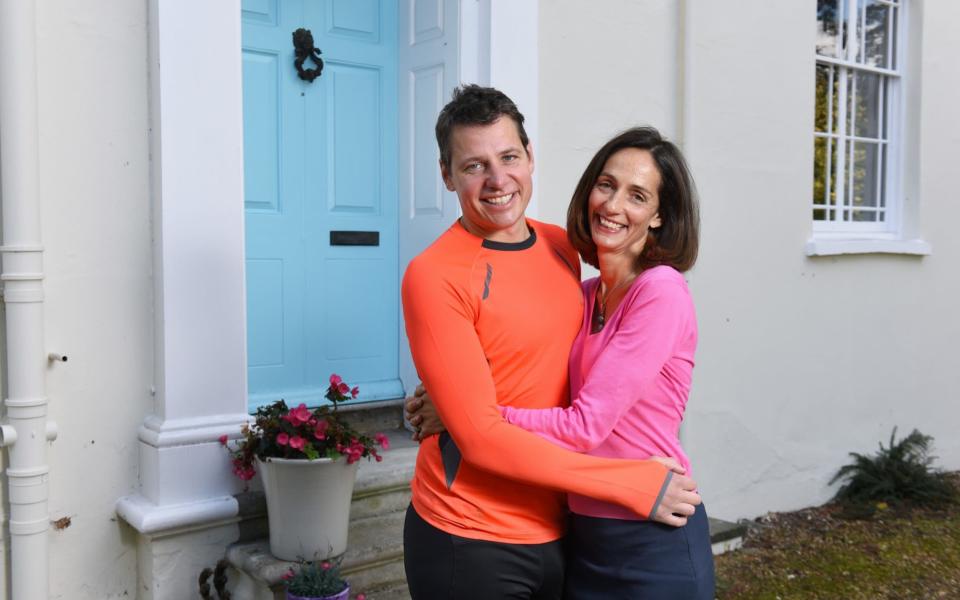
Section two: Personal
7. What do you consider your greatest strength and weakness?
Why?
A chance to hear your partner’s internal chatter.
Take it further
I’m always interested to know which part of the question – whether it’s their greatest strength or weakness – my clients find hardest to answer and why.
8. What ambitions have you yet to achieve?
Why?
Looks into the future.
Take it further
I believe it’s important to review your life every so often, or you will be living on autopilot and when you turn round 10 years have gone by – and that leads to resentment or even a midlife crisis. A good follow-up question to ask yourself or your partner is: why haven’t you achieved them yet?
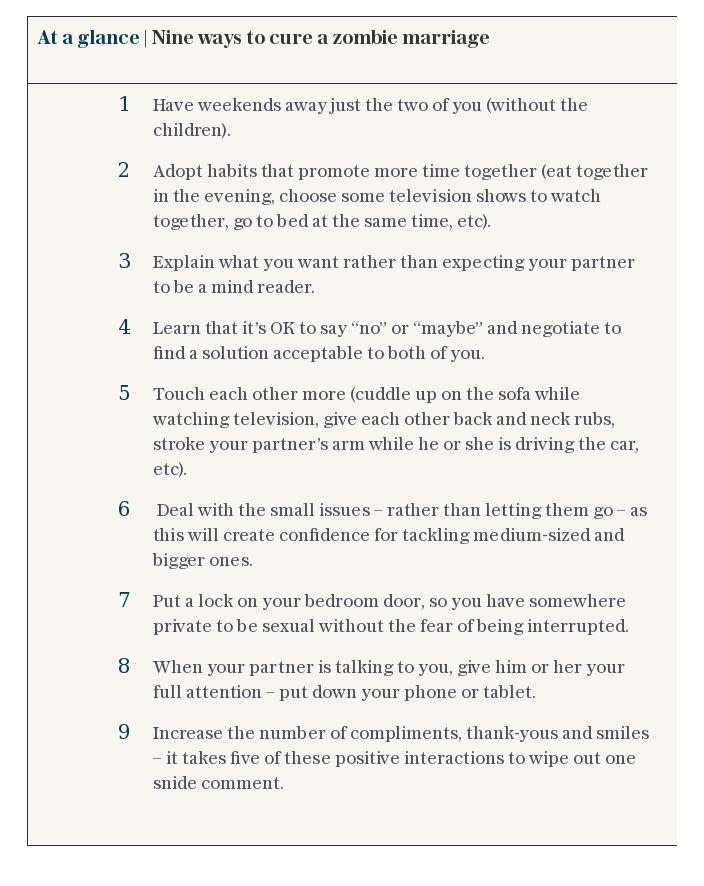
9. Tell your life story from childhood to today in about five minutes.
Why?
The stories we tell ourselves shape many of our choices and reactions to adversity. This is a chance to get your core narrative out in the open and really hear it yourself (and maybe for the first time admit it to yourself).
Take it further
Look at the recurrent themes. Is it an ascending narrative (everything getting better) or a descending one (getting worse) or does it have ups and downs (which is probably more realistic)? What surprised you about your own story and what did you feel while listening to your partner’s?
10. What is the most terrible memory from your childhood?
Why?
This is perhaps the most personally revealing question as our childhood shapes our adult selves.
Take it further
Look at how and why this moment still resonates today.
11. Do you have a secret hunch about how you will die?
Why?
It introduces the fact that we’re not going to live forever and need to make every second count together rather than settling for an OK or even disappointing relationship.
Take it further
A chance to examine your fears and anxieties. Does it help to look ahead or is it better to live in blissful ignorance? If a fortune-teller could predict when you’d die, would you like to know?
12. What gives meaning to your life?
Why?
A question that everybody should ask themselves, especially in middle age when we look back at the first half of our life and forward into the second half, otherwise we get bogged down doing things that drain rather than feed us.
Take it further
Knowing what drives your partner allows you to tell the difference between simple wants and fundamental needs, and to be a team to help each other live more meaningfully. Have you thought about this question before? What feelings does it elicit?

Section three: your relationship
In this section, take turns to ask the question first, and try not to duplicate your partner’s answers.
13. What qualities did I possess that made you think I was someone special?
Why?
It’s a question I often ask my clients in the first session to remind them of their special bond.
Take it further
How do you feel about those qualities now? Has what first attracted you at the beginning become an issue today? For example, did you like your partner’s outgoing personality but today feel he or she is not focused enough on home and family?
14. What was, for you, the most memorable moment of our wedding day or our first date?
Why?
It’s a landmark day and a happy memory from which to draw strength.
Take it further
Share other anecdotes from your wedding or when you first met.

15. What three things do we have in common?
Why?
A warm-up question to start talking about your relationship today.
Take it further
How have the things we share in common changed over the years? Is this good or bad?
16. When have you been made to feel small and ashamed? Please give an example where I didn’t cause the shame and one where I did.
Why?
Shame is the most difficult emotion to cope with. This is because rather than challenging one particular behaviour (“You have left the bathroom in a mess”), it can often seem as if it is about our whole personality (“You’re lazy” or “a slob”). That’s why I describe shame as the opposite of love (which is about accepting us, warts and all).
Take it further
Thank your partner for being so honest. Sympathise with the pain of the event for which you were not responsible and apologise for pain caused by the one that you triggered. Maintain good eye contact and be certain to hold hands at this point: it will help lessen the pain.
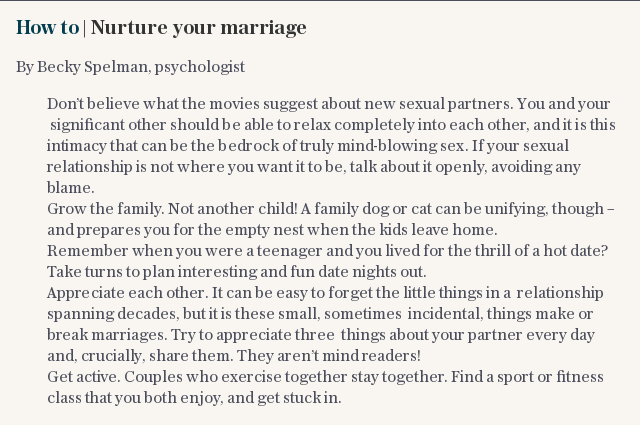
17. What, if anything, is too serious to be joked about in our relationship?
Why?
It encourages you both to acknowledge the potential no-go areas.
Take it further
What we don’t talk about gathers power in the shadows and becomes more frightening. I’m not asking you to discuss these issues now but please ask each other: How could we address these topics in the future? What would make it easier?
18. Complete this sentence: I wish I had someone with whom I could share...
Why?
Begins to look into the future.
Take it further
I should stress that the someone does not have to be your partner. It is good to have separate interests. Please also discuss how you feel about your partner having close friends and if and when each of you feels excluded. What new shared activity might you like to do together?
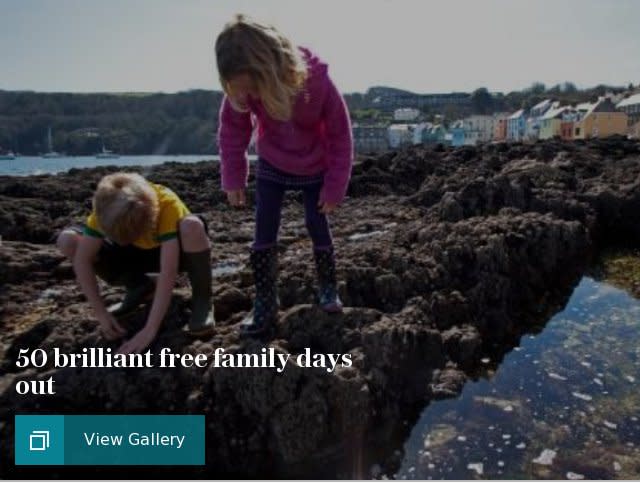
19. If there was one small thing about my behaviour that you’d like me to change, what would it be?
Why?
Leaves you both invested in carrying on the conversation.
Take it further
Try to make these complaints similar in severity, so that it feels like a fair trade. For example, when they got married, my mother agreed to stop reading at bedtime and my father to stop dunking his biscuits in his tea.
20. Which question was hardest to answer and why?
Why? An opportunity to look back on the exercise together.
Take it further
If you had tried to guess which your partner found hardest, would you have been correct? What surprised you about your partner’s answers? What about your own?
So, how was it for us?
As a device to trigger talk between tired spouses, this exercise worked (but then so did the chardonnay). Our answers confirmed sometimes-diverging priorities: I’d like to be stranded in a jungle with Tina Fey because she’d make me laugh; Mat with Ray Mears, “because he would help me to eat and stay alive”.
There were no big surprises. (“Secret hunch” about how you’ll die? Me: “I bet I wander into traffic.” Mat: “I’m surprised you haven’t done it already.”) Instead, it was the small reveals that proved touching. Mat “felt most grateful” (Q6) to his parents, for the start they’d worked so hard to give him in life. We enjoyed swapping notes on each other’s special qualities – and when I struggled to find my “greatest strength”, Mat stepped in – praising my “great resilience”, mostly in the face of being married to him.
Things only got sticky towards the end: Q18 and 19 seem designed to explore areas of potential drift. Inevitably, Mat and I started targeting one another’s flaws which, as any long-term couple knows, is like shooting fish in a barrel. Scraps brushed off, however, our date with ‘20 Questions” felt like an ambient session of DIY couples’ therapy. It made us feel companionable – conspiratorial even – but did it rekindle a lost spark? Sadly not: we just chuckled like Dastardly and Muttley hunched on our bar stools. So are we doomed? Or are we, maybe (fall off our stools) still in love…?
For more information or to order the book, see andrewgmarshall.com


